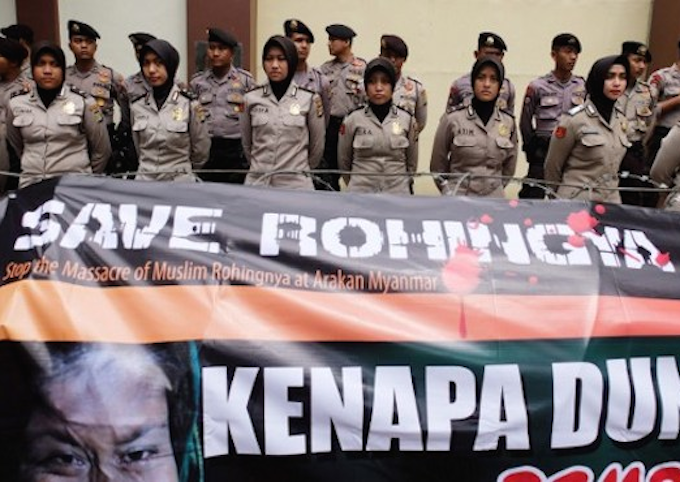
By Ryan Dagur and Katharina R. Lestari in Jakarta
There is rising concern in majority Muslim Indonesia that the treatment being meted out to ethnic Muslim Rohingya by military forces in Myanmar could lead to regional tensions.
Islamic organisations have joined calls to end the conflict while Jakarta is making efforts to deal with the crisis which has forced tens of thousands to flee, amid a bloody military crackdown in Myanmar’s ethnically divided Rakhine State after border police were attacked and killed in October.
The United Nations estimated at least 65,000 refugees were in camps in Bangladesh, while Dhaka has said some 50,000 Rohingya have crossed its border in the last two months.
Nahdatul Ulama, Indonesia’s largest Islamic organisation has said the conflict was totally unjustified and had injured human values.
“Muslims in general feel the pain because of the Rohingya’s suffering,” the organisation’s leaders said in a statement.
They called on world leaders, Southeast Asian countries and the UN to take concrete measures to end the violence and show humanitarian solidarity
Muhammadiyah, Indonesia’s second largest Islamic organisation said the Rohingya crisis was “violating and trampling human rights”.
Act firmly call
Anwar Abbas, its chairman, called on the Organisation of Islamic Cooperation, an international organisation with 57 member countries, to act firmly against the Myanmar government.
“If this continues then it is not impossible to invite new tensions that threaten the peace of the world,” he warned.
He also expressed deep disappointment over inaction by Myanmar’s leader, State Counsellor Aung San Suu Kyi, and urged the revocation of her Nobel Peace Prize.
In Malaysia, thousands of people, led by Prime Minister Najib Razak took to the streets on December 4, branding the Rohingya situation as “genocide”.
Similar but smaller protests have also occurred in Indonesia.
In November, hundreds of Indonesians protested outside the Myanmar embassy in Jakarta, calling for an end to the “genocide.”
Indonesia’s government has made diplomatic overtures with Foreign Affairs Minister Retno Marsudi meeting Aung San Suu Kyi twice last month: on December 6 and December 19.
Diplomatic efforts
Marsudi said that such diplomatic efforts have been taken to try and bridge communications between Myanmar and Bangladesh, whose relations have continued to deteriorate because of conflicts in their border areas.
“I’m carrying out diplomacy carefully and without creating a tumult, because the Rohingya conflict is a very sensitive issue related to a fully sovereign state; the sovereignty of a state must be respected,” she told Antara news agency.
Daniel Awigra, Asean program manager at the Jakarta-based Human Rights Working Group said Indonesia can be an example of the process of democratisation for Myanmar.
Indonesia was built on diversity and so is Myanmar, he said. So Myanmar could see Indonesia as a state with credible democracy.
However, “what needs to be paid attention to is the agenda of sending humanitarian aid for Rohingya, investigation into crimes and security sector reform as well as the elimination of the 1982 citizenship law which rejects Rohingya identity,” he said.
Father Agustinus Ulahayanan, secretary of the Bishops’ Commission for Ecumenical and Inter-religious Affairs, said the Rohingya issue “is about ethnicity and politics”.
He thanked Muslim leaders for not linking the issue to religious sentiments.
Never close its eyes
For the Catholic Church, he said, the Catholic community will never close its eyes to any humanitarian crisis.
“I heard that a few dioceses had launched a solidarity movement. Even a diocese, of which I cannot mention for a certain reason, had collected money during a Sunday mass to help our Rohingya brothers and sisters,” he said.
Similarly, Sahat Martin Philip Sinurat, chairman of the Indonesian Christian Student Movement, called on the Indonesian government not to link the Rohingya issue to religious sentiments.
The Rohingya issue is an issue of citizenship, not a religion-based one, he said.
Ryan Dagur and Katharina R. Lestari are correspondents for the Union of Catholic Asian News (UCA News).















































THERE ARE MUCH MISUSE of the words ‘GENOCIDE’ , “SLOW BURNING GENOCIDE’ AND ‘ETHNIC CLEANSING’ these days.
World meida and right groups are falsely accusing the Buddhist Rakhine people of ‘genocide’ against the Bengali (‘Rohingya’) Muslims.
That is not even close to being a situation that can use the term ‘Genocide’.
The only true genocide in Burma was the 1942 Maungdaw Genocide – where Bengali Muslims (the term ‘Rohingya’ was unknown then) armed by the British to fight the Japanese in WWII did not fight the Japanese,
but instead, turned the weapons on the dominant, indigenous Buddhist Culture, killing 30,000 Buddhists in Maungdaw township alone, burned over 400 Buddhist villages, and sent 100,000 Buddhists fleeing for their lives
These are attempts by so-called Rohingya to cover their exaggerated and manipulative accusations against the Rakhine Buddhists in western Burma, with the inflammatory charge of: ‘genocide against the Rohingya Muslims’.
[…] Source ; https://asiapacificreport.nz/2017/01/15/concern-growing-in-indonesia-over-rohingya-genocide-crisis/ […]
Dear Richard,
If what you said happened, then this doesn’t justify treating a mistake or action by another horrible action.
Comments are closed.